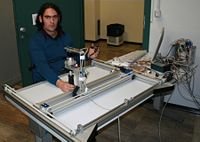Relationship between Cognition and Emotion in Rehabilitation Robotics
Relationship between Cognition and Emotion in Rehabilitation Robotics
| |
| Coordinator: | AndreaBonarini (andrea.bonarini@polimi.it), MatteoMatteucci (matteo.matteucci@polimi.it) |
| Tutor: | SimoneTognetti (tognetti@elet.polimi.it) |
| Collaborator: | |
| Students: | |
| Research Area: | Affective Computing |
| Research Topic: | Affective Computing And BioSignals |
| Start: | 2009/04/08 |
| End: | 2010/11/02 |
| Status: | Active |
Contents
Project description
The project is aimed at studying the relationship between Cognition and Emotions in a Robotic rehabilitation task. Rehabilitation robots aims at developing robotics system that can be used to perform rehabilitation session with patients that have different kinds of motion disease. Affective computing can improve the performance of the rehabilitation process by adapting the therapy to the patient's need. We use a classifier system that is able to discriminate among different stress levels in order to assess the relationship between the task difficulty and the stress felt by the subject.
The project is partially funded by Italian Institute of Technology and is done in collaboration with the Fondazione Maugeri and the Department of Bioengineering of the Politecnico di Milano
What the media said
Link to Politecnico press folder on this topic
Other Politecnico di Milano people involved in the project
Laboratory work and risk analysis
Laboratory work for this project will be mainly performed at AIRLab/Lambrate. It will include electrical and electronic activity. Potentially risky activities are the following:
- Use of soldering iron. Standard safety measures described in Safety norms will be followed.
- Use of high-voltage circuits. Special gloves and a current limiter will be used.
- Robot testing. Standard safety measures described in Safety norms will be followed.
- Use of a modified (human-guided) golf cart. We will use the cart only in open-air environments.
